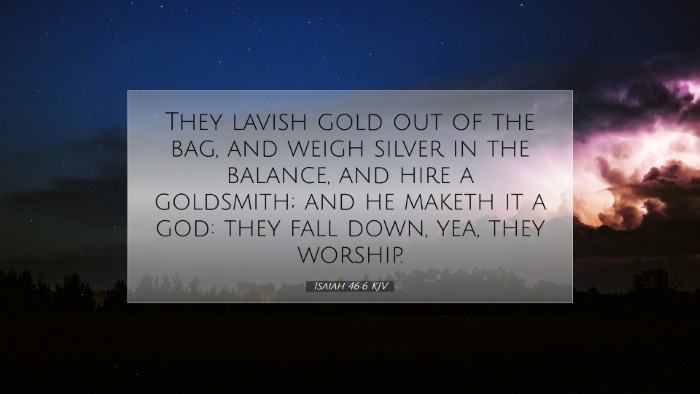Commentary on Isaiah 46:6
The verse Isaiah 46:6 states: "They lavish gold out of the bag, and weigh silver in the scales, and hire a goldsmith; and he maketh it a god: they fall down, yea, they worship." This passage addresses the futility of idolatry and contrasts the true God with the idols crafted by human hands.
Introduction
This commentary explores the significance of Isaiah 46:6 through the lenses of historical contexts, theological implications, and practical applications. The insights drawn from various public domain commentaries provide a holistic understanding suitable for pastors, students, theologians, and Bible scholars.
Contextual Analysis
Isaiah was a prophet during a time of significant upheaval in the kingdom of Judah, facing threats from foreign powers and internal spiritual decline. This verse is part of a passage where God contrasts His eternal sovereignty with the impotence and foolishness of idol worship.
The Threat of Idolatry
As Albert Barnes points out, one of the key issues addressed in Isaiah is the worship of false gods. In this verse, the imagery of gold and silver signifies the riches and the effort people expend to create their own deities, thus indicating their misplaced priorities. The act of crafting an idol from precious metals highlights humanity's tendency to worship what they can control rather than surrendering to the true God.
Divine Sovereignty vs. Human Craftsmanship
Matthew Henry expounds on the contrast between the living God and man-made idols. God declares, “To whom will ye liken me?” (Isaiah 46:5), emphasizing His unique nature. All the efforts in crafting an idol serve only to reveal human weakness, underscoring the ridiculousness of praying to inanimate objects.
Historical Context
Understanding the historical context is crucial. During Isaiah's time, the Babylonian culture was rife with idolatry, and this worship often involved elaborate rituals and offerings. Adam Clarke comments on how the materials used for idols were often taken from wealth that could otherwise serve God's purposes, thus showcasing the tragedy of misplaced devotion.
Theological Implications
The theological implications of Isaiah 46:6 are profound, offering insights into the nature of God and the relationship He has with His creation.
Majesty of God
Henry emphasizes the majesty of God in contrast to the frailty of idols. The act of worshipping an idol, which is merely the product of human hands, diminishes the honor due to God, who is the Creator of all things. This invites the question of where true majesty and worth lie—whether in the transient, crafted deities or the everlasting God.
Human Nature and Idolatry
Adam Clarke notes that idolatry is reflective of humanity's fallen nature—a desire to make gods in our image, ones that fulfill our needs and desires. This points to a deep philosophical inquiry into the roots of human worship and the implications of creating God in our image rather than aspiring to reflect His glory.
Invitation to Trust in God
By contrasting the idols with Himself, God invites His people to recognize their need for Him. Barnes highlights that God calls out to His people not to trust in the works of their hands but to place their trust in the living God who sustains them.
Practical Application
Your personal response to Isaiah 46:6 can lead to impactful changes in worship practices, lifestyles, and spiritual growth.
Evaluating Our Idols
Pastors and leaders are called to help congregants evaluate what may serve as idols in their lives—whether material possessions, status, or even other relationships. This passage prompts reflection on how easily one can prioritize these over a life fully surrendered to God.
Encouragement in Worship
Understanding that God desires a relationship with His community motivates us to pursue authentic worship, one that respects Him as Creator and sustainer, rejecting the distractions of the world. Clarke encourages worshipers to bring their hearts before the living God rather than dead idols.
Conclusion
Isaiah 46:6 presents a powerful reminder of the futility of idol worship in light of God’s sovereignty and majesty. As we delve into the interpretations provided by public domain commentaries, scholars can gain clarity on historical significance, theological implications, and practical steps toward authentic worship. Let this verse encourage the pursuit of truth, calling all worshipers to align their lives with the God who commands our reverence and devotion.


